



| User's Overall Height | Standard; 33" - 48" Mini Kit; 28" - 32" |
| Frame Width | 25" |
| Seat Height Range | 10" - 25" |
| Seat Angle (Tilt-in-Space) | Forward; 15 degrees Back; 15 degrees |
| Backrest Angle Adjustment | Forward; 5 degrees Back; 20 degrees |
| Seat Height from Footboard | 9" - 12" |
| Seat Height from Footboard with Footboard Lift | 6" - 9" |
| Seat Width without Hip Guides | 12" |
| Seat Width with Optional Hip Guides | 7" - 9" |
| Seat Depth | Standard; 8" - 12" Mini Kit; 7" - 11" |
| Armrest Height from Seat | 5" - 7.5" |
| Trunk Support Width | 5.5" - 11.5" |
| Backrest Height from Seat | 12.5" - 15.5" |
| Headrest Height from Seat | 14.5" - 21" |
| Maximum Working Load | 75 lbs. |

| Specifications of the Rifton Small Activity Chair with Hi-Lo Base | |
| User's Overall Height |
Standard: 33" - 48" with Mini Kit: 28" - 32" |
| Frame Width | 25" |
| Seat Height Range | 10" - 25" |
| Seat Angle (Tilt-in-Space) |
Forward: 15 degrees Back: 15 degrees |
| Backrest Angle Adjustment |
Forward: 5 degrees Back: 20 degrees |
| Seat Height from Footboard | 9" - 12" |
| Seat Height from Footboard with Footboard Lift | 6" - 9" |
| Seat Width without Hip Guides | 12" |
| Seat Width with Optional Hip Guides | 7" - 9" |
| Seat Depth |
Standard: 8" - 12" with Mini Kit: 7" - 11" |
| Armrest Height from Seat | 5" - 7.5" |
| Trunk Support Width | 5.5" - 11.5" |
| Backrest Height from Seat | 12.5" - 15.5" |
| Headrest Height from Seat | 14.5" - 21" |
| Maximum Working Load | 75 lbs |
Size Guide:

| IMAGES OF ACCESSORIES | ACCESSORY DESCRIPTIONS |
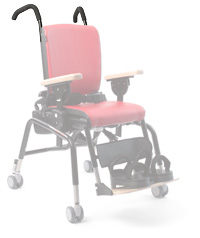 |
Push handles provide an easy and ergonomic way for a caregiver to maneuver chair and transport user. |
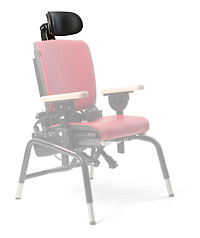 |
A headrest can be purchased with either a flat or contoured headpiece and adjusts both horizontally and vertically for optimum positioning. |
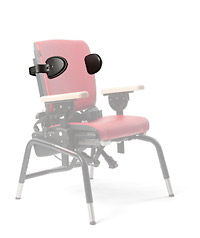 |
Lateral supports provide comfortable side-to-side support for the user and are fully adjustable in height, width, and angle to assist in trunk positioning. Lateral supports can be purchased with or without chest strap attached. |
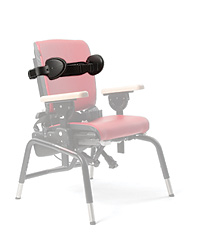 |
Lateral supports with chest strap combine lateral and anterior support in the same accessory. |
 |
The wide chest strap can provide anterior support. Note: This wide chest strap may be used with the lateral supports, but will not be in line with them. To combine chest strap and lateral supports on the same accessory, see "Lateral supports with a chest strap." |
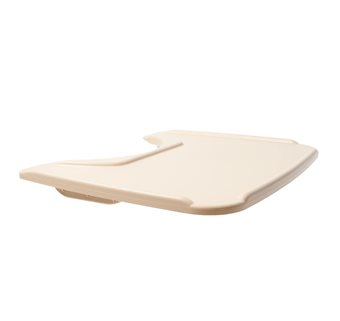 |
The tray provides a firm surface for seated activities such as eating and art and adjusts in height, angle and depth. A softly-rounded rim contains spills.
Note: The tray attaches to the wooden armrests only, not to forearm prompts. |
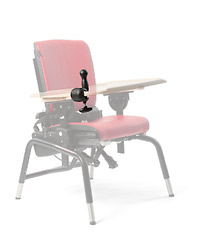 |
A handhold can be attached anywhere along the rim of the tray to provide additional support and security for upper-body positioning. |
 |
A butterfly harness can provide anterior support while allowing maximum freedom of movement. |
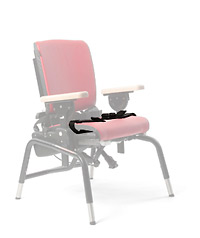 |
A thigh belt can provide additional support and security for user's thighs, and helps adduct user's knees. |
 |
The pelvic harness may be used in place of a seatbelt as the primary means of securing the user in the chair. This alternative to the more typical seatbelt gives a very stable base for developing sitting postural control. The pelvic harness firmly positions the user's pelvis by securing the hips and upper thighs, without placing pressure on the abdomen. |
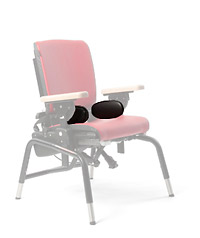 |
Hip guides provide additional lateral support to the user's hips and can be independently adjusted for best fit. Hip guides are clipped to the arm supports and can, therefore, be easily removed along with the arm supports for transfers. Hip guides can be used with both types of arm supports-½" armrests and forearm prompts. |
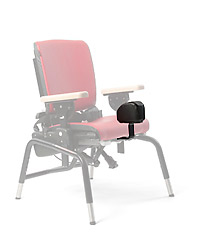 |
The abductor can be used to aid in positioning of user's knees, keeping them comfortably apart. |
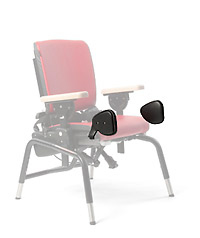 |
Adductors can be used to limit lateral movement of user's knees and provide a comfortable lateral boundary. |
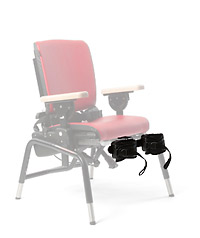 |
The leg prompt can be used instead of an abductor and provides both abduction and adduction positioning. |
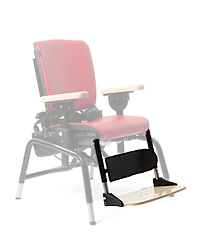 |
The footboard provides firm support for the user's feet, particularly when the seat of the chair is raised too far for the user's feet to touch the floor. The footboard also serves as a base for ankle straps, sandals, and wedges. It can support the weight of both user and caregiver during transfers, and/or can be swung beneath the seat for transfers. |
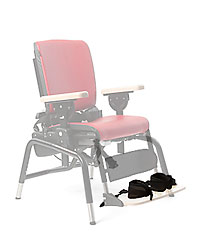 |
Ankle straps can be used on the footboard to secure the user's feet while providing a bounded range of movement. Note: Ankle straps cannot be used simultaneously with sandals. |
 |
Sandals can be used with the footboard to provide positive positioning of the user's feet. Adding wedges beneath the sandals allows for a custom fit of sandal height and tilt. Note: Sandals cannot be used simultaneously with ankle straps. |
 |
Wedges can be added beneath the sandals on the footboard to customize the positioning of user's feet by adjusting sandal height and tilt. |
 |
For the child that needs additional positioning, the lumbar and seat support kit can be used to custom-cut and fit extra postural support. |
 |
The backrest filler pad can provide additional lower back support when the chair backrest is set in one of the three highest positions, resulting in an open space between the backrest and the seat. The backrest filler pad fills this gap. |
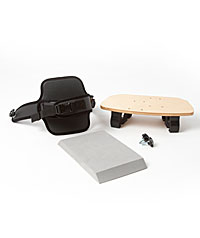 |
Mini kit: Makes the Small Activity Chair a prime option for Early Intervention for the smallest and youngest child, from 6 months up to 2 years. Remove it as the child grows and keep using the same chair for many more years. |